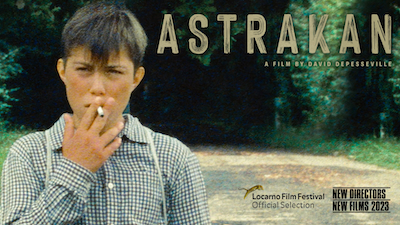ASTRAKAN (France 2022) ***
Directed by David Depesseville

ASTRAKAN opens with a shot of a boy looking at the cage of a tarantula in a zoo. The similarities of the loneliness that exists between both the boy and the spider become apparent. The boy is then rushed into the car with the other two children as they go to the farm of the mother’s family, greeted by her brother.
The relationship between the boy and the foster family, his emotions, and how all are affected are slowly revealed in director David Depesseville’s debut feature. This is a coming-of-age story of Samuel, an unloved and lonely, orphaned boy who ends up learning life lessons the hard way.
Samuel is gradually forced to face the demons he is holding on to internally, as well as those that exist within his new family. Swept up in the motions of coming of age for the very first time — falling in love with the girl next door, exploring hobbies, and indulging in childhood passions — he also begins to learn of the secrets his foster family (a nasty one involving incest) are keeping, leading him to question everything around him. As these questions emerge, Samuel is pushed in and out of crippling anguish, bridging a harsh gap between dense realism and feverish fantasy which leads to a stunning and transcendent final act, not to be revealed in this review.
There is a certain similarity between Samuel (even in his looks) with the boy in Francois Truffaut’s masterpiece on the trials of children immersed in the world of adults in L’ARGENT DE POCHE (SMALL CHANGE). One of the most emotional moments in Truffaut’s film is a teacher speaking to his class right after one of the students was discovered with abuse marks on his body during a school health inspection. The teacher speaks on the abuse of children and how children, just as adults have rights as well. The classic Punch and Joy scene in Truffaut’s 400 BLOWS is mirrored in the clownish juggling segment in which the camera focuses on the different reactions of the kids watching the show. Samuel is himself given a thrashing from his foster father after he opens his room door to him after being promised that he will not be hit. In ASTRAKAN, during a church service, the priest preaches from the Bible how Jesus says that a man will not be allowed to enter the Kingdom of Heaven if he does not treat a child right, for such is the Kingdom of Heaven.
Samuel displays both a sense of innocence and an altered innocence that results from his current situation. Will good or evil emaciate from the boy?
Samuel is teased as the ‘foster boy’. He gets a beating for soiling his pants. But the bad is also balanced with intimate moments as in the time he buys an ornament for his foster mother with the words engraved “I love you, mother”, at the gym when he is given a pat on the back for his improvement in gymnastics.
ASTRAKAN is a powerful coming-of-age film of altered innocence, marvelously captured at points by director Deppesville, displaying the best traits of French Nouvelle-vague director Francois Truffaut in his early classics such as L’ARGENT DE POCHE, L’ENFANT SAUVAGE and 400 BLOWS. The film has a muddled somewhat confusing ending where various images of Samuel’s past incidents are strung together.
Trailer:



Comments powered by CComment